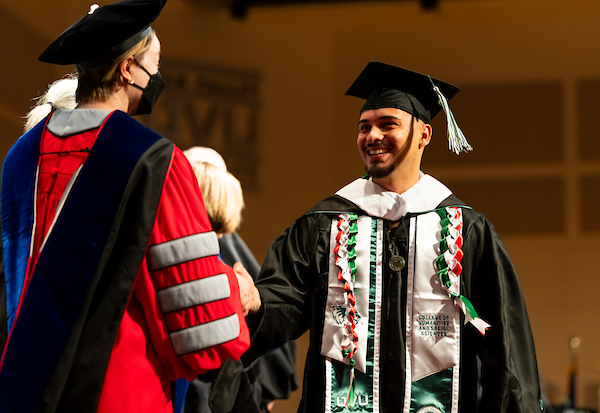
Course Schedule
| Fall Semester First Year | |
|---|---|
| SW 6000 | Social Work Practice I—Generalist Practice with Individuals |
| SW 6200 | Human Behavior and the Social Environment |
| SW 6250 | Macro Systems and Social Impact |
| SW 6630 | Mental Health Assessment in Social Work Practice |
| SW 6910 | Foundation Field Practicum I |
| Spring Semester First Year | |
|---|---|
| SW 6020 | Social Work Practice II—Generalist Practice with Families & Groups |
| SW 6400 | Social Work Research Methods |
| SW 6300 | Social Welfare Policy and Analysis |
| SW 6320 | Social Work Practice with Diverse Populations |
| SW 6920 | Foundation Field Practicum II |
| Fall Semester Second Year | |
|---|---|
| SW 6030 | Social Work Practice III—Advanced Practice with Individuals |
| SW 6050 | Social Work Practice V—Advanced Practice with Organizations and Communities |
| SW 6500 | Social Work Practice with Substance Related and Addictive Disorders |
| SW 6930 | Advanced Field Practicum I |
| SW Elective | |
| Spring Semester Second Year | |
|---|---|
| SW 6040 | Social Work Practice IV—Advanced Practice with Families and Groups |
| SW 6940 | Advanced Field Practicum II |
| SW 6950 | Advanced Applied Research—MSW Capstone |
| SW Elective | |

Course Schedule
| Summer Semester | |
|---|---|
| SW 6490 | MSW Advanced Standing Bridge Course + Research |
| SW 6630 | Mental Health Assessment in Social Work Practice |
| SW 6491 | MSW Advanced Standing Skills Course + Research |
| Fall Semester | |
|---|---|
| SW 6030 | Social Work Practice III—Advanced Practice with Individuals |
| SW 6050 | Social Work Practice V—Advanced Practice with Organizations and Communities |
| SW 6500 | Social Work Practice with Substance Related and Addictive Disorders |
| SW 6930 | Advanced Field Practicum I |
| SW Elective | |
| Spring Semester | |
|---|---|
| SW 6040 | Social Work Practice IV—Advanced Practice with Families and Groups |
| SW 6940 | Advanced Field Practicum II |
| SW 6950 | Advanced Applied Research—MSW Capstone |
| SW Elective | |

Mission Statement
The Master of Social Work (MSW) program at Utah Valley University empowers students to engage with the complexities of human behavior within diverse and dynamic environments. Grounded in the person-in-environment framework, our program shapes social workers who are equipped to drive positive, sustainable change, promoting well-being for individuals, families, groups, organizations, and communities.
Rooted in scientific inquiry, our curriculum equips students with the knowledge and skills necessary to navigate and address the multifaceted challenges faced locally and globally. Through strengths-based, research-informed social work practice, students learn to apply the planned change model—engagement, assessment, goal setting, intervention, evaluation, and transition—to improve well-being across diverse settings.
Guided by values of service, integrity, social justice, and the importance of human relationships, our program fosters a deep understanding of the interplay between laws, policies, and culture, and their impact on access to equitable opportunities and services. We prepare students to advance human rights to enhance the quality of life for all people.
With a strong emphasis on trauma-informed care, mental health, and addiction related coursework, we support the development of competent, ethical practitioners who are committed to the dignity and worth of every person.
Program Learning Outcomes
Belonging, Diversity, and Social Justice
Utah Crisis Worker Certification
Our program's crisis intervention course (SW 6640) is approved by the Utah Department of Health and Human Services to be recognized for the Utah Crisis Worker Certification. Students who pass this course and graduate may then be certified as a Crisis Worker, opening up additional employment opportunities.